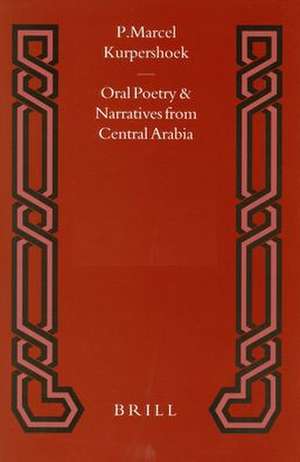Oral Poetry and Narratives from Central Arabia, Volume 2 Story of a Desert Knight: The Legend of Šlēwīḥ al-‘Aṭāwi and other ‘Utaybah Heroes. An Edition with Translation and Introduction
Autor Marcel Kurpershoeken Limba Engleză Paperback – 4 oct 2022
The introduction discusses inter alia the general characteristics of Bedouin oral culture, the linguistic, prosodic and stylistic features of the text, and Xālid's use of his ancestors' oral legacy in order to enhance his position in the tribal hierarchy of prestige. In addition to the translation of the oral text this volume offers a complete transcription, based on taped records and including variants found in published Saudi sources, and a substantial glossary.
Preț: 315.85 lei
Nou
Puncte Express: 474
Preț estimativ în valută:
60.44€ • 63.27$ • 50.01£
60.44€ • 63.27$ • 50.01£
Carte indisponibilă temporar
Doresc să fiu notificat când acest titlu va fi disponibil:
Se trimite...
Preluare comenzi: 021 569.72.76
Specificații
ISBN-13: 9789004520981
ISBN-10: 9004520988
Pagini: 536
Dimensiuni: 155 x 235 mm
Greutate: 0.73 kg
Editura: Brill
Colecția Brill
ISBN-10: 9004520988
Pagini: 536
Dimensiuni: 155 x 235 mm
Greutate: 0.73 kg
Editura: Brill
Colecția Brill
Notă biografică
Marcel Kurpershoek is a senior research fellow at New York University Abu Dhabi. A specialist in the oral traditions and poetry of Arabia, he is the author of the five-volume Oral Poetry and Narratives from Central Arabia (Brill), as well as several books on Middle Eastern history and culture. He served as Netherlands ambassador to Pakistan, Afghanistan, Turkey, and Poland, and as special envoy to Syria until 2015.
Recenzii
'His work should inspire others to explore the neglected field of the nineteenth century and present-day literature production from the area. This book can be recommended not only for professionals but also for readers interested in culture, tradition, literary output of to-day's living Bedouins.'
Barbara Ostafin, Folia Orientalia, 1995.
'...un outil exceptionnel...Un tel ouvrage...permet aussi, mieux que toutes les introductions à la poésie arabe, de se faire une idée plus précise des conditions dans lesquelles la poésie préislamique était composée...il serait souhaitable que la lecture de ces travaux soit conseillée, et même fortement recommandée à ceux qui entreprennent de s'initier à la langue et à la littérature arabes anciennes.'
Bruno Paoli, Bulletin d'Etudes Orientales, 1995.
'Throughout its considerable length, this second volume displays the same literary insight, sociological acumen, and meticulous attention to scholarly detail as the first volume. It is an entertaining as well as erudite study, beautifully produced, and, like its predecessor, is frequently illuminated by flashes of a refreshing and self-deprecating humor. Would that all academic monographs were as readable as this...This book is a must for a wide variety of readers: social and cultural anthropologists of every hue, but especially of Arabia; literary historians of Arabic; and, last but not least, Arabic dialectologistss. On the strenght of these first two volumes, there seems little doubt that Kurpershoek's odyssey through the oral culture of Arabia is destined to take its place as a classic work in the field.'
Clive Holes, Journal of the American Oriental Society, 1998.
'The book lives up to the expectations earned by the previous volume, Kurpershoek has filled in important gaps in our knowledge of the poetry, history and dialects of the region and provided an encyclopedic reference work on the 'Utaibah, in particular, who have not up till now been treated extensively in any language and not at all in English. We look forward to the appearance of the third volume in the series.'
B. Ingham, Bulletin of the School of Oriental and African Studies, 1998.
Barbara Ostafin, Folia Orientalia, 1995.
'...un outil exceptionnel...Un tel ouvrage...permet aussi, mieux que toutes les introductions à la poésie arabe, de se faire une idée plus précise des conditions dans lesquelles la poésie préislamique était composée...il serait souhaitable que la lecture de ces travaux soit conseillée, et même fortement recommandée à ceux qui entreprennent de s'initier à la langue et à la littérature arabes anciennes.'
Bruno Paoli, Bulletin d'Etudes Orientales, 1995.
'Throughout its considerable length, this second volume displays the same literary insight, sociological acumen, and meticulous attention to scholarly detail as the first volume. It is an entertaining as well as erudite study, beautifully produced, and, like its predecessor, is frequently illuminated by flashes of a refreshing and self-deprecating humor. Would that all academic monographs were as readable as this...This book is a must for a wide variety of readers: social and cultural anthropologists of every hue, but especially of Arabia; literary historians of Arabic; and, last but not least, Arabic dialectologistss. On the strenght of these first two volumes, there seems little doubt that Kurpershoek's odyssey through the oral culture of Arabia is destined to take its place as a classic work in the field.'
Clive Holes, Journal of the American Oriental Society, 1998.
'The book lives up to the expectations earned by the previous volume, Kurpershoek has filled in important gaps in our knowledge of the poetry, history and dialects of the region and provided an encyclopedic reference work on the 'Utaibah, in particular, who have not up till now been treated extensively in any language and not at all in English. We look forward to the appearance of the third volume in the series.'
B. Ingham, Bulletin of the School of Oriental and African Studies, 1998.
